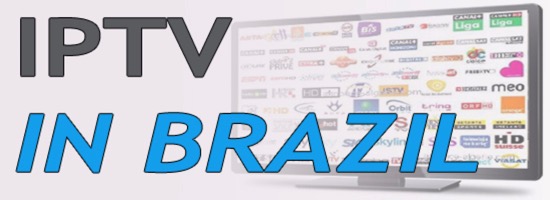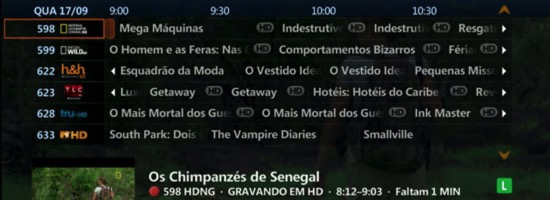
IPTV in Brazil
IPTV in Brazil

The demand for better quality, greater variety of content, option to consume interactive services are the main points for the growing of the technology and fall in the taste of users. The Television over IP is an alternative technology to DTH that instead of using satellite systems uses a part of the internet bandwidth. This requires a set-top box to change the IP signal to your television. To be able to use the service you need at least an exclusive connection of 4 Mbps for HD content with MPEG-4 compression. However, each channel determines the transmission rate, such as Globo TV that requires HD programming delivering to the client at 18 Mbps.

In addition to the interactive system, you can do purchases, access movie sites, videos, music and photo presentations without the necessity of a computer. In the security system can highlight two transmission systems, CAS (Conditional Access System) where there is control of transmission of a service to the consumer; and DRM (Digital Rights Management) that allows or not the use of digital imaging products, video or audio.

In Brazil, the pioneer was Brasil Telecom with Videon in Brasilia (DF), allowing the viewer to acquire films, documentaries, cartoons, concerts, shows and exclusive content that go beyond the concept of broadcasting, as a combination of telephony services directly on television. Today there are some initiatives at Telefônica, Oi, CTBC and Sumicity in Rio de Janeiro.
Another trend is the Unicast mode, since the possibility IPTV content and flexibility, such as on-demand services. The programming grid (EPG) customization is a one-way, in case of interactivity, and there is a lot of opportunities, exploration and a lot of research to do in this field. It is worth mentioning that connectivity with mobile devices is essential to the success of IPTV and the possibility of content in 4K and 8K with compatible TVs.

The success of the service will depend on some regulatory obstacles and other technologies such as FTTH, with the aid of optical fiber on delivery of a service with great quality. The QuadPlay with IPTV can replace the use DTH, excluding satellite system dependence, which in adverse conditions the signal may be interrupted, such as during storms or co-exist in a hybrid way. In 2015, the increase in service was 43.24% compared to the previous year, DTH had 60.07% of the market in July 2015, against 61.01% in December 2014 (according to data from Convergecom).

Among the problems faced in Brazil to implement the mass service, there is the limitation of Internet quality (great use of radio, instead of optical fiber) and outdated infrastructure that do not support enough amounts of data. It is therefore essential investment in fiber and high-capacity backbones for the proper functioning. By the end of this year, it is likely that Brazilian market grows along the upgrades of IPTV.
More news on the subject and future trends, you can see here in Broadcast Brazil.
video:
We would like to thank Marcel Almeida for writing for us.
More info you can find on his LinkedIn: br.linkedin.com/in/marcelmg77/en or follow him on Twitter @marcelmg77
Like us if you want on Facebook, follow us on Twitter and Subscribe to our YouTube channel.
mentioned:
Brasil Telecom : Website - Facebook - Twitter - YouTube
Telefônica : Website - Facebook - Twitter - YouTube
Oi : Website - Facebook - Twitter - YouTube
CTBC : Website - Facebook
Sumicity : Website - Facebook - Twitter - YouTube
Interview: Marcio Zukin, CTO SimTV

IPTV News Editor Jamie Beach interviews Marcio Zukin, CTO of Brazilian over-the-top video service Sim TV, on plans to move into transactional and ad-supported offerings, the television services that Brazilians value most, and the opportunity created by pay-TV piracy.
Marcio will be speaking at the TV Connect Latin America 2013 event taking place in São Paulo on 2nd-3rd July. For more information and to register, please visit latam.tvconnectevent.com
Jamie: Can you tell us a little about SimTV’s connected TV initiatives to date?
Marcio: Our connected TV initiatives include subscription VOD and live TV. SimTV was designed for delivery on every kind of device and also through an IP Box.
Eventually the platform will be developed in order to feature transactional and ad-supported services.
The focus of the project was to provide a very robust solution, using adaptive bit-rate technology, CDN networks and global data centres in the cloud, in order to deliver the best interface and a user-friendly workflow to the customer.
Jamie: What do you think Brazilians value most in a television service, beyond linear programming?
Marcio: There is a need to differentiate between content and service. In terms of content, Brazilians in general value football games and sports, movies, kids programming and comedies or sitcoms.
Regarding services, Brazilians value innovation, programmes with social comment and interaction, and which are up-to-date and available on a 24-hour basis.
Jamie: How big a problem is pay-TV piracy in Brazil?
Marcio: Pay-TV piracy in Brazil is not a problem, it is an opportunity, and a big one.
Let me explain. In my opinion, people turn to piracy for a number of reasons, almost as an ‘after the fact’ event.
If people would have a service, with reasonable quality, at an affordable and fair price, with dependability and good customer care, there would be no need to resort to illegal practices regarding pay-TV.
Many initiatives have already demonstrated this vision.
Jamie: What growth opportunities can you see in the pay-TV market?
Marcio: The pay-TV market has huge growth opportunities, in volume and quantity. Various industry surveys project that there will be 4.4mn active clients for IPTV services by 2017 in the Latam countries alone.
A huge variety of content and types of service is emerging: for example, an Italian that lives in Rio could watch live an Italian game in Recife at his tablet, early in the morning while still in bed.

Then a few hours later he could be watching a recent specific Italian movie back in his apartment simultaneously (in a social network) with his friends that live in Italy.
While watching the movie, he uses the tablet as a second screen not only as a remote control but also to buy something that appears in the movie in an e-commerce site, or get more information on historical events related to a character of the movie, post a note on Facebook, and so on.
Event video:
Be sure to check the Broadcast Brazil Facebook page and LIKE us.
Lot's of news, photo's and info for broadcasters, webcasters and mobile producers in Brazil.
Mentioned:
Sim TV
TV Connect Latam
